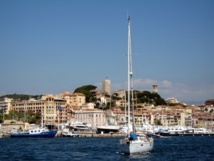At Cannes, pain and loss of migration come to the fore
Richard Ingham and Sophie Laubie
CANNES, France, Richard Ingham and Sophie Laubie- They set off with dreams of a new life only to find that peril, exploitation, loneliness and an aching rootlessness often await them.
Migration, one of the great issues of globalisation but one that until now has been poorly explored at the movies, has emerged as a major theme at the Cannes Film Festival.

Image by Henri Kerschbaumer
People struggle to keep their souls as they work in garment factories owned by greedy foreign bosses, and flounder in their relationships with distant families. To live with dignity, violence is their only choice -- a theme that also runs through "wuxia" martial arts movies.
"The wuxia films are what gave me the inspiration," director Jia Zhangke told AFP. "There is a spirit of nobility which runs through these films, and it is the same one you will see in some people in today's society."
Desperation and violence also lie at the core of "The Immigrant", in which Marion Cotillard stars as a devout Catholic Polish immigrant, who arrives at New York's Ellis Island in the 1920s and becomes ensnared in prostitution.
Director James Gray said he wanted to make the movie as a period piece, reminding people today that immigrants may be despised when they arrive, but they eventually become accepted as part of a nation's wealth.
"(Immigration) is one of the most important aspects of a dynamic culture," he told a press conference. "It enriches a society. It doesn't debase society."
Other films, also well-received, touch on the plight of clandestine immigrants.
"Stop-Over," a 149-minute documentary by Iranian-Swiss Kaveh Bakhtiari in the "Directors' Fortnight" screenings, follows a group of Iranian men who are smuggled across the border from Turkey to Greece but can go no further.
Lacking a permit to stay in Greece and the visa that will get them to other European countries, the men eke out their lives in a tiny apartment in Athens, tossed between despondency and crazy hopes of a fake passport that will get them to Sweden or Norway or Spain or Italy.
Bakhtiari's camcorder follows the Iranians as they make their rare forays out of their refuge, terrified of being arrested or beaten up by the Greek police or jailed.
"Just buying a toothbrush meant running an unbelievable risk," said Bakhtiari.
Greece's economic collapse and the rise of the xenophobic far right "has made the situation catastrophic," he said. "Migrants have become the scapegoats for the country's problems."
"La Jaula de Oro" (The Cage of Gold), by Mexican-based Spanish director Diego Quemada-Diez, tells the odyssey of teenagers desperate to cross into the United States.
Quemada-Diez said he was drawn to make the film after speaking to migrants who had braved violence, theft and arrest in their quest for the land of gold.
"I felt their outrage in the face of global injustice, in the face of impassive governments," he said. "I had the feeling that the stories they told me had to be told to others... to make people reflect."
"Born Somewhere" by Mohamed Hamidi explores the ravaged connections that come from migration as a young Frenchman returns to his family in Algeria.
He meets a cousin who thinks of only one thing: shrugging off the poverty and hassle of life in North Africa and living in France.
Over the last decade, thousands of economic migrants have arrived on the shores of Europe, and hundreds have drowned en route, sometimes ditched by their smugglers.
"I've tried first and foremost to explain why men and women take such risks to leave their home and family," said Hamidi.
"It's not to live on welfare or to get paid holidays -- it's just to get a better life for their children. Immigration is always talked about in general terms, but we forget that behind each family is a multitude of personal stories and life journeys."
----------------------------------------------------------------------------------------------